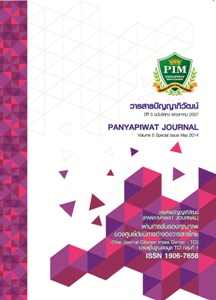การจัดการความรู้...ปัจจัยสู่ความสำเร็จ
Main Article Content
บทคัดย่อ
บทคัดย่อ
บทความนี้ จะนำเสนอเรื่อง การจัดการความรู้...ปัจจัยสู่ความสำเร็จ ซึ่งปัจจุบันนี้ นับว่าเป็นยุคของเศรษฐกิจฐานความรู้ ดังนั้นความรู้จึงเป็นอำนาจ (Knowledge Power) เนื่องจากความรู้เป็นสิ่งที่ผูกพันอยู่กับงานหรือกิจกรรมของแต่ละบุคคลในองค์การ ซึ่งความรู้ที่ใช้ในการทำงานนั้น จะถูกสร้างขึ้นโดยผู้ปฏิบัติงาน หรือกลุ่มผู้ปฏิบัติงานเอง ซึ่งอาจสร้างขึ้นจากการเลือกเอาความรู้เชิงทฤษฎีหรือความรู้จากภายนอกมาปรับแต่ง เพื่อการใช้งาน หรือสร้างขึ้นโดยตรงจากประสบการณ์ในการทำงานก็ได้ ดังนั้นความรู้ที่จะนำมาใช้เพื่อให้องค์การบรรลุตามเป้าหมายนั้น จำเป็นจะต้องมีกระบวนการหรือขั้นตอนในการจัดการความรู้อย่างเป็นระบบ ทั้งนี้การจัดการความรู้ ไม่ใช่ศาสตร์ของการพัฒนาองค์การที่มุ่งเฉพาะการใช้เทคโนโลยี และเครือข่ายแต่เพียงอย่างเดียวอีกต่อไป แต่ได้กลายเป็นศาสตร์ใหม่ที่องค์การชั้นนำทั่วโลก ไม่เว้นแม้แต่ในสถานศึกษา ก็ได้มีการนำเทคนิคการจัดการความรู้ไปปรับใช้ในสถานศึกษาของตนเอง เพื่อการพัฒนาเพิ่มพูนศักยภาพของผู้ปฏิบัติงาน เพิ่มผลผลิต และเพิ่มการบริการขององค์การที่มีประสิทธิภาพมากยิ่งขึ้น ดังนั้นหากเราใช้กระบวนการจัดการความรู้ เพื่อค้นหาวิธีปฏิบัติที่เป็นเลิศได้โดยใช้กิจกรรมเยี่ยมชมเพื่อแลกเปลี่ยนเรียนรู้ ทั้งนี้เพื่อให้ง่ายต่อการค้นพบวิธีปฏิบัติที่เป็นเลิศ และเมื่อบุคลากรมีวิธีที่ปฏิบัติเป็นเลิศแล้วนั้นก็จะทำให้เกิดผลการปฏิบัติงานที่เป็นเลิศ และท้ายที่สุดจะทำให้องค์การประสบความสำเร็จในการดำเนินงานอีกด้วย
Article Details
“ข้าพเจ้าและผู้เขียนร่วม (ถ้ามี) ขอรับรองว่า บทความที่เสนอมานี้ยังไม่เคยได้รับการตีพิมพ์และไม่ได้อยู่ระหว่างกระบวนการพิจารณาลงตีพิมพ์ในวารสารหรือแหล่งเผยแพร่อื่นใด ข้าพเจ้าและผู้เขียนร่วมยอมรับหลักเกณฑ์การพิจารณาต้นฉบับ ทั้งยินยอมให้กองบรรณาธิการมีสิทธิ์พิจารณาและตรวจแก้ต้นฉบับได้ตามที่เห็นสมควร พร้อมนี้ขอมอบลิขสิทธิ์บทความที่ได้รับการตีพิมพ์ให้แก่สถาบันการจัดการปัญญาภิวัฒน์หากมีการฟ้องร้องเรื่องการละเมิดลิขสิทธิ์เกี่ยวกับภาพ กราฟ ข้อความส่วนใดส่วนหนึ่งและ/หรือข้อคิดเห็นที่ปรากฏในบทความข้าพเจ้าและผู้เขียนร่วมยินยอมรับผิดชอบแต่เพียงฝ่ายเดียว”
เอกสารอ้างอิง
ชุมศักดิ์ อินทร์รักษ์. (2548). บุคลากรทางการศึกษา: ทักษะในการจัดการความรู้ (Knowledge Management Skil:KMS.) วารสารบริหารการศึกษามหาวิทยาลัยขอนแก่น, ฉบับมกราคม-มิถุนายน.
นพคุณ ทอดสนิท. (2552). การวิเคราะห์พหุระดับ : ผลกระทบของความสัมพันธ์การแลกเปลี่ยนทางสังคมในสถานที่ทํางานและภาวะผู้นําที่มีต่อพฤติกรรมการเป็นสมาชิกที่ดีของพนักงานสาขาธนาคารไทยพานิชย์ในเขตกรุงเทพมหานครและปริมณฑล. ดุษฎีนิพนธ์, มหาวิทยาลัยศรีปทุม
Bass, B.M. and Avolio, B.J.(1994). Improving organization effectiveness through transformational leadership, Thousand Oaks, CA : Sage.
Daft, R.L. (2006). The leadership experience. 3rd ed. Canada : South-Westerm.
Daff, R.L. (2006) The new era of Management. Australia : Thomson/South-Western.
Denison, D.R. (2007). what is Organizational Culture? Retrieved October 29, 2008, from http://www.denison-consulting.com/de/portals/o/docs/WPaper_What_is_org.
Davenport, T.H., & Prusak, L. (1998). Working knowledge: How Organizations Manage What They Know. Boston: Harvard Business School Press.
Ghalib, Kamran. (2004). Systemic Knowledge Management : Developing a Model for Managing Organisational Assets for Strategic and Sustainable Competitive Advantage. Journal of Knowledge Management Practice, (January). (Online). Available: http://www.tlainc.com/articl97.htm. Accessed (10 October 2005).
Gruber, H. G. (2000). Does organizational Culture Affect the Sharing of Knowledge? The Case of A Department in High-Technology Company. A thesis submitted to the Faculty of Graduate Studies and Research in partial fulfillment of the requirements for the Degree of Master of Management Studies.Carleton University Ottawa.Ontario.
Hurley, T.A., Green, C.W. (2005). Creating a knowledge management culture: the role of task, structure, technology and people in encouraging knowledge creation and transfer (Electronic Version). Retrieve June 8, 2008, from Mid West Academy Web site: http://64.233.169.104/ search?q=cache:3bHjmNR6-rwJ:www.midwestacademy.org/Proceedings/2005/papers/ HurleyGreen%2520revision.
Hussain, Fareed and Others. (2004). Managing knowledge Effectively. Retrieved October 10, 2005, from http://www.tlainc.com/articl66.htm. Accessed. [10 October 2005).
Lee, Martyn. (1997). Relocating Location: Cultural Geography, the Specificity of Place and the City Habitus in McGuigan Jim (eds.) Cultural Methodologies. London: Sage Publication Ltd.
Mathis and Jackson. (2003). Human Resource Management. 10th ed. Thomson-South Western.
Marquardt, M. (1996). Building the Learning Organization. New York : McGrawHill.
Nonaka, Kujiro and Takeuchi, hirotaka. (1999). Classic Work : Theory of Organizational Knowledge Creation in Morey, D., M.T. and Thuraisingham, B.M. Knowledge Management : Classic and Contemporary Work. Mass: The MIT Press.
Nonaka, kujiro and Takeuchi, Hirotaka. (2005). Classic work : Theory of Organizational Knowledge.
Creation. Morey, D., Maybury, M.T. and Thuraisingham, B.M. Knowledge Management : Classic and Contemporary Work. Mass. : The MIT Press.
Patrick S. W. Fong and Cecilia W. C. Kwok. (2009). Organizational Culture and Knowledge Management Success at Project and Organizational Levels in Contracting Firms. Journal of construction engineering and management.
Senge, P.M. 1990. The Fifth Discipline: The Art and Practice of the Learning Organization. New York:Currency Doubleday.
Stewart, T. (1997). Intellectual capital: the new wealth of organizations. New York, Doubleday.
Suvasubramainm, N., Murry, W.D., Avalio, B.J., & Jung: D.I. (2000). "A longitudinal model of the effects of team leadership and group potency on group performance.” Group & Organization Management, 27, 66-96.


